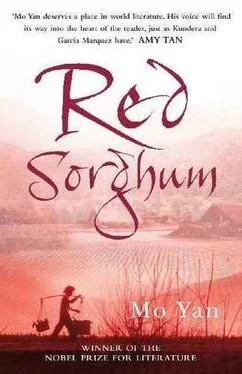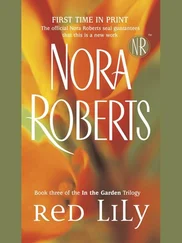Mo Yan - Red Sorghum
Здесь есть возможность читать онлайн «Mo Yan - Red Sorghum» весь текст электронной книги совершенно бесплатно (целиком полную версию без сокращений). В некоторых случаях можно слушать аудио, скачать через торрент в формате fb2 и присутствует краткое содержание. Год выпуска: 2003, Издательство: Arrow, Жанр: Современная проза, на английском языке. Описание произведения, (предисловие) а так же отзывы посетителей доступны на портале библиотеки ЛибКат.
- Название:Red Sorghum
- Автор:
- Издательство:Arrow
- Жанр:
- Год:2003
- ISBN:нет данных
- Рейтинг книги:3 / 5. Голосов: 1
-
Избранное:Добавить в избранное
- Отзывы:
-
Ваша оценка:
- 60
- 1
- 2
- 3
- 4
- 5
Red Sorghum: краткое содержание, описание и аннотация
Предлагаем к чтению аннотацию, описание, краткое содержание или предисловие (зависит от того, что написал сам автор книги «Red Sorghum»). Если вы не нашли необходимую информацию о книге — напишите в комментариях, мы постараемся отыскать её.
, a novel of family and myth, is told through a series of flashbacks that depict events of staggering horror set against a landscape of gemlike beauty, as the Chinese battle both Japanese invaders and each other in the turbulent war years of the 1930s.
A legend in China, where it won major literary awards inspired the Oscar-nominated film,
is a book in which fable and history collide to produce fiction that is entirely new and unforgettable.
Red Sorghum — читать онлайн бесплатно полную книгу (весь текст) целиком
Ниже представлен текст книги, разбитый по страницам. Система сохранения места последней прочитанной страницы, позволяет с удобством читать онлайн бесплатно книгу «Red Sorghum», без необходимости каждый раз заново искать на чём Вы остановились. Поставьте закладку, и сможете в любой момент перейти на страницу, на которой закончили чтение.
Интервал:
Закладка:
Ever since the battle at the Black Water River, the villagers had been preparing for the calamity they expected to come any day. Only three or four families had gone into hiding; the others, though frightened, were reluctant to give up their broken-down homes, their wells — bitter and sweet — and their quilts, no matter how thin and tattered they might have been. During the week of the lull, Granddad had taken Father into the country town to buy bullets, driven by a desire to settle accounts with Pocky Leng. It never occurred to him that the Japanese bloodbath would inundate his own village.
On the evening of the fifteenth day of the eighth lunar month, Zhang Ruolu the Elder — he with one large eye and one small, he with the extraordinary bearing, he the intellectual who had studied in a private school, he who had played such a vital role in the burial of the martyred warriors — mobilised all able-bodied residents to reinforce the village wall and repair the gates, and appointed night watchmen to bang gongs and shout warnings at the first sighting of enemy troops. The villagers, male and female, young and old, took turns manning the wall. Mother told me that the voice of Ruolu the Elder was loud and crisp, almost metallic. ‘Fellow villagers,’ he said, ‘a people united in spirit can move Mount Tai. Only if we’re united in spirit can we keep the Japs out of our village!’
As he was speaking, a shot rang out from the farmland beyond the village, and an elderly watchman’s head exploded; he rocked back and forth, then tumbled off the wall, sending the villagers scurrying for cover. Ruolu the Elder, dressed in tight pants and shirt, stood in the middle of the road and shouted, ‘Fellow villagers, calm down! Mount the wall as we planned! Don’t be afraid to die. Those who fear death will find it, those who don’t will live on! Our lives are all that stand between the Japs and our village!’
Mother watched the men run to the wall and throw themselves down on their bellies. My maternal grandmother, whose knees were knocking, was frozen to the spot. ‘Beauty’s dad,’ she shouted tearfully, ‘what about the children?’ My maternal grandfather ran back to her, rifle in hand, and lashed out, ‘What are you wailing about? Now that it’s come to this, it makes no difference whether we live or die!’ She didn’t dare utter a sound, but the tears kept flowing. He turned to look at the village wall, which hadn’t yet come under fire, grabbed Mother with one hand and her brother with the other, and ran with them to the vegetable garden behind the house, where there was an old abandoned well, its rickety windlass still in place. He looked down into the well and said, ‘Since there’s no water, we’ll hide the children here for the time being. We can come back for them after we’ve driven the Japs off.’ Grandmother stood like a block of wood and bowed to his wishes.
Grandfather took the loose end of rope from the windlass and tied it around my mother’s waist, just as a shriek split the sky above them and a howling black object crashed into the neighbour’s pigsty. There was an ear-splitting explosion, and everything seemed to disintegrate as a column of smoke rose from the sty; pieces of shrapnel, patches of dung, and chunks of pig flew in all directions. A stumpy leg fell right in front of Mother, the white tendons all curled inward like river leeches. It was the first mortar explosion my fifteen-year-old mother had ever heard. The surviving pigs squealed frantically and came dashing out of the sty; Mother and my little uncle were crying hysterically.
‘They’re firing mortars!’ Grandfather announced. ‘Beauty, you’re fifteen now, so you’ll have to take care of your brother down in the well. I’ll come back for you after the Japs are gone.’ As another mortar shell exploded in the village, he cranked the windlass and lowered Mother into the well. When her feet touched the broken bricks and crumbling clay at the bottom, she looked up at the ray of light far above her, barely able to make out Grandfather’s face. ‘Untie the rope,’ she heard him yell. After doing as she was told, she watched the rope rise jerkily up the well. She could hear her parents arguing, the exploding Jap mortar shells, and finally the sound of her mother crying. Grandfather’s face reappeared in the ray of light. ‘Beauty,’ he shouted, ‘here comes your brother. Make sure you catch him.’
Mother observed the wailing descent of my three-year-old uncle, his arms and legs flailing. The rotting piece of rope quivered in the air; the windlass protested with long-drawn-out creaks. Grandmother leaned into the well opening until nearly all the upper half of her body was in view; sobbing uncontrollably, she called out my uncle’s name: ‘Harmony, my little Harmony…’ Mother watched Grandmother’s glistening tears fall like crystal beads to the bottom of the well. The rope played out as Little Uncle’s feet touched the bottom, where he tearfully implored his mother, ‘Ma, pull me up, I don’t, I don’t want to be down here, I want to stay with you, Ma, Ma.’
Grandmother reached out for the rope and strained to pull it back up. ‘Harmony, my darling baby, my precious son…’
Then Mother saw Grandfather grab Grandmother’s hand, which had a death grip on the rope. Grandfather shoved her hard, and Mother saw her fall sideways. The rope snapped taut, and Little Uncle flew into Mother’s arms.
‘You fucking woman!’ Grandfather screamed. ‘Do you want them up here so they can die with the rest of us? Get over to the wall, and be quick about it! No one’ll get out alive if the Japs enter the village!’
‘Beauty — Harmony — Beauty — Harmony —’ But Grandmother’s shouts seemed so far away. Another mortar shell exploded; earth fell on them. They didn’t hear Grandmother’s voice any more after the explosion. Above them only a single ray of light and the old windlass.
Little Uncle was still crying as Mother untied the rope from around his waist. ‘Good little Harmony,’ she said to comfort him. ‘Don’t cry, baby brother. The Japs’ll come if you keep crying. If they hear a kid crying they’ll come with their red eyes and green fingernails….’
That stopped him. He looked up at her with his tiny, round black eyes, and threw his pudgy little arms around her neck. More and more mortar explosions lit up the sky, joined now by machine-gun and rifle fire. Pop pop pop , a pause, then pop pop pop . Mother looked skyward, listening carefully for movement around the well. She heard the distant shouts of Ruolu the Elder and the screams of the villagers. The well was cold and damp. A chunk of the side fell off, exposing pale earth and the roots of a tree. The bricks were covered with a layer of dark-green moss. Little Uncle stirred in her arms and began to sob again. ‘Sis,’ he said, ‘I want my mama, I want to go back up….’
‘Harmony, good Little Brother… Mom went with Dad to fight the Japs. They’ll come get us as soon as they’ve driven them off….’ Mother, who was trying to comfort her baby brother, started to sob, too. They hugged each other tightly as their sobs and tears merged.
Dawn was breaking, as Mother could tell from the pale light above her. Somehow they’d got through the long night. An eerie, frightening silence hung over the well. She looked up and saw a ray of red light illuminate the walls far above her. The sun was up. She listened carefully, but the village seemed as still as the well, although every once in a while she thought she heard what sounded like a peal of thunder rolling across the sky. She wondered if her parents would come to take them out of the well on this new day, back to the world of light and air, a world where there were no banded snakes or skinny toads. The events of the previous day seemed so far away that she felt as though she’d spent half her lifetime at the bottom of the well. Dad, she was thinking, Mom. If you don’t come, Brother and I surely will die down here. She resented her parents for casting their own children into the well and simply vanishing, not caring whether they were dead or alive. The next time she saw them, she’d make a huge scene to release the bellyfull of grievances she’d already stored up. How could she have known that, as she was being carried away by these hateful thoughts, her mother — my maternal grandmother — had been blown to pieces by a Japanese mortar shell, and her father — my maternal grandfather — had exposed himself to enemy gunfire on the wall, only to have half of his head blown away by a bullet that seemed to have eyes?
Читать дальшеИнтервал:
Закладка:
Похожие книги на «Red Sorghum»
Представляем Вашему вниманию похожие книги на «Red Sorghum» списком для выбора. Мы отобрали схожую по названию и смыслу литературу в надежде предоставить читателям больше вариантов отыскать новые, интересные, ещё непрочитанные произведения.
Обсуждение, отзывы о книге «Red Sorghum» и просто собственные мнения читателей. Оставьте ваши комментарии, напишите, что Вы думаете о произведении, его смысле или главных героях. Укажите что конкретно понравилось, а что нет, и почему Вы так считаете.












